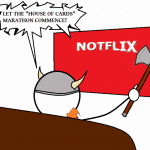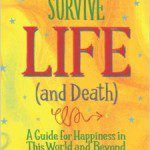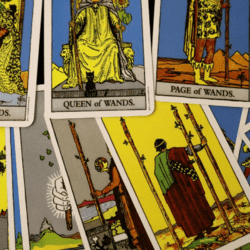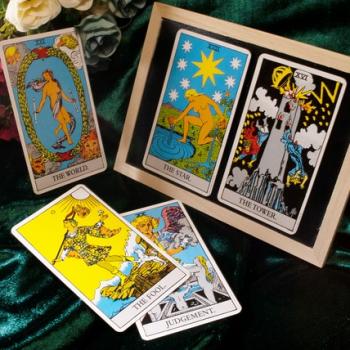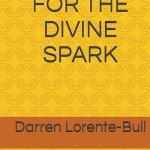Review by Molly Khan
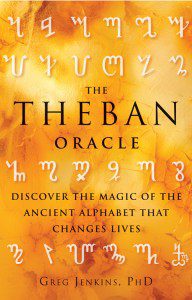 I must admit, I am a bit of a divination junkie. Growing up, I found an old copy of the I Ching at the back of my small-town public library, and was immediately completely fascinated. Unable to check the book out for more than two weeks at a time, I spent the entire summer copying the translated notes for each symbol into an old journal so that I could consult it at my leisure. Later I discovered tarot cards, and then the runes and ogham, and since then I’ve learned or invented a dozen systems of divination – unlocking the symbols, at first so incomprehensible, became a major focus of my life.
I must admit, I am a bit of a divination junkie. Growing up, I found an old copy of the I Ching at the back of my small-town public library, and was immediately completely fascinated. Unable to check the book out for more than two weeks at a time, I spent the entire summer copying the translated notes for each symbol into an old journal so that I could consult it at my leisure. Later I discovered tarot cards, and then the runes and ogham, and since then I’ve learned or invented a dozen systems of divination – unlocking the symbols, at first so incomprehensible, became a major focus of my life.
So I was very excited to find The Theban Oracle by Greg Jenkins. Historically, the Theban alphabet was first published in the 1500’s, though it is attributed there to Honorius of Thebes, a possibly mythical magician of whom we know very little. It has been picked up in the last few decades as a witch’s alphabet, sometimes used by Wiccans and others with a witchcraft bent to hide the information written in their Book of Shadows. I personally never worked with this alphabet, and so I came at this book with little background knowledge of the letters themselves.
Historically, the Theban alphabet is not particularly linked with divination or fortune-telling; this system is an invention of the author, Greg Jenkins. There are some who would be dissuaded by this, but honestly, most of our modern systems of divination are just that – modern. I appreciate the author’s refreshing candor regarding the origins of this system, and I think it makes for a more interesting system as a whole. The ancient letters themselves provide a beautiful and atmospheric backdrop to Jenkins’s innovative ideas, and also lend a certain weight of the ages to the oracle.
Instead of simply assigning each letter a simple meaning and going from there, Jenkins chose to associate each letter of the Theban alphabet with a historical figure affiliated with magick or the occult. This gives us not only the relatively simple keywords that come with each letter, but also a rich background tapestry waiting to be researched, if one so chooses. For instance, the letter Zain, which is equivalent to the letter G in English, is represented by Hypatia of Alexandria. The simple keywords here are “sovereign feminine spirit, inward wisdom,” which can be informative and helpful during a reading – but knowing the story of Hypatia, how she stood protecting the Library of Alexandria against an angry Christian mob and was killed for it, brings those keywords to life. This is a system you can sink your divinatory teeth into.
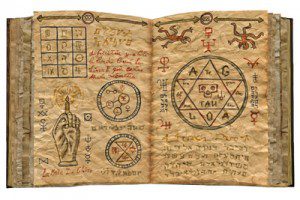
Casting the stones (or sticks, or whatever you choose to craft the symbols from) is very simple, and Jenkins also describes several spreads to try if one is more inclined towards an orderly layout. Personally, I prefer to toss and read them where they fall. One problem I did encounter was my unfamiliarity with the alphabet itself – as is common among symbolic systems of divination. Because of my lack of knowledge here, it took me a great deal of time to correctly identify and look up each symbol; someone who has previously learned the alphabet as a cipher would probably have a great deal more luck with this.
Jenkins also provides a few rituals for working with the Theban oracle if you are more interested in the magickal side of things. There is a cleansing ritual, ideas for candle magick, and examples of various spells that might be enhanced by the Theban letters.
Overall, I greatly enjoyed The Theban Oracle, and it’s something I’ll be holding on to even with my limited bookshelf space. There is a lot of room for exploration here. Greg Jenkins has achieved the enviable accomplishment of creating a divination system with a great deal of depth and utility, while still being easy to understand by those just beginning along a magickal path.
The reviewer received a courtesy copy of this book for the purpose of review.
Molly Khan is a writer, student, and mother of three from the Midwest prairie. She is a founding member and liturgist for Prairie Shadow Protogrove, ADF. She writes about her joys and struggles as a mother and a Heathen Druid, as well as her experiences raising children in an interfaith household at thepagangrove.blogspot.com.


